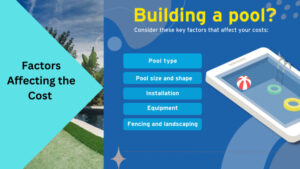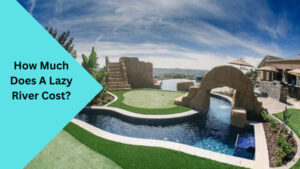Have you ever dreamed of floating along a gentle current, completely relaxed and carefree? Lazy rivers provide the perfect opportunity to do just that. Whether you want to enhance your backyard oasis or create a unique water attraction for a commercial establishment, building a lazy river is a fantastic option.
But how much does a lazy river cost? In this blog post, we will explore the various factors that influence the cost of a lazy river, average pricing, design considerations, and even some maintenance and operational expenses. So dive in and let’s uncover all the details!
What is a Lazy River?
Before diving into the costs, let’s understand what exactly a lazy river is. A lazy river is a winding pool or water feature that mimics the slow-moving current of a river. It offers a relaxing experience where individuals can float leisurely on inflatable tubes or simply wade in the shallow waters. Lazy rivers are popular in water parks, hotels, resorts, and even residential properties. They provide a unique and enjoyable way to spend time in the water, allowing visitors to unwind and enjoy a gentle, meandering flow.
Benefits of Having a Lazy River Pool
Lazy rivers offer several benefits that make them an attractive addition to any property. Here are a few advantages of having a lazy river pool:
1. Relaxation and Stress Relief: Lazy rivers provide a serene and calming environment, allowing individuals to escape from the hustle and bustle of daily life. The gentle current and soothing water create a tranquil atmosphere, promoting relaxation and reducing stress levels.
- Entertainment and Fun: Lazy rivers offer endless hours of entertainment for both children and adults. Whether it’s a cool refreshing dip on a hot summer day or a leisurely float with friends and family, lazy rivers provide a fun-filled experience for all ages.
- Enhanced Property Value: Installing a lazy river can significantly increase the value of your property, particularly in the case of commercial establishments such as hotels and resorts. The unique feature adds to the overall appeal and attractiveness of the property, making it more desirable to potential buyers or visitors.
- Fitness and Exercise: While lazy rivers are primarily associated with relaxation, they can also be used for leisurely exercise. Walking against the current or performing gentle water workouts can help improve cardiovascular health and muscle tone.
Now that we understand the benefits, let’s dive into the factors that influence the cost of a lazy river.
Factors Affecting the Cost of a Lazy River

The cost of building a lazy river can vary significantly depending on various factors. Understanding these factors will help you estimate the cost and make informed decisions. Here are the key considerations:
Pool Size and Shape
The size and shape of the lazy river pool directly impact the overall cost. Larger pools with more intricate shapes require a larger amount of materials, increased labor, and longer construction times, thereby increasing the cost. Additionally, irregular shapes and custom designs may require additional engineering and design work, further adding to the expenses.
To explore more details and considerations regarding gunite Pool shape, our comprehensive guide on Can You Change the Shape of Gunite Pool has you covered.
Materials Used
The choice of materials plays a significant role in determining the cost of a lazy river. The pool lining, decking, filtration systems, water pumps, and other components all contribute to the overall expense. Opting for high-quality materials may initially increase the cost but can result in better durability and longevity, saving you money in the long run.
Additional Features
Including additional features in your lazy river, such as waterfalls, fountains, or cave-like structures, can significantly impact the cost. These features not only enhance the aesthetics but also add to the overall experience. However, it’s important to consider the budget and feasibility of these features, as they may require additional construction and operational expenses.
Location and Accessibility
The location and accessibility of your property can affect both the construction process and the cost. Difficult terrain, remote locations, or limited access to utilities may require additional effort, resulting in increased labor costs. It’s essential to factor in these elements during the planning phase to ensure a smooth construction process and avoid any unexpected expenses.
Labor Costs
Labor costs can vary depending on the complexity of the project, local labor rates, and the level of expertise required. Hiring experienced professionals ensures the construction is done efficiently and effectively, but it may come at a higher cost. On the other hand, opting for a DIY approach can save money but requires significant time, effort, and skill.
Now that we’ve covered the factors affecting the cost, let’s dive into the average pricing of building a lazy river.
Average Cost of Building a Lazy River Pool
The cost of building a lazy river pool can range from several thousand dollars to hundreds of thousands, depending on the size, materials, features, and additional expenses. While it’s challenging to provide an exact cost without specific project details, we’ll provide a general cost breakdown to give you an idea.
Cost Breakdown
Here is a breakdown of the typical cost distribution for building a lazy river:
- Construction and Excavation: Approximately 30-40% of the total cost is allocated towards excavating the area and constructing the pool structure. This includes hiring equipment, removing soil, building walls, and creating a foundation.
- Materials and Equipment: Around 25-35% of the cost is dedicated to purchasing materials such as pool liners, decking, pumps, filters, pipes, and other equipment required for the lazy river pool.
- Labor and Professional Fees: Depending on your decision to hire professionals or opt for a DIY approach, labor costs can range from 20-30% of the total budget. Hiring professionals ensures quality workmanship and reduces the risk of mistakes or delays.
- Additional Features and Aesthetics: If you choose to include additional features like waterfalls, fountains, or decorative structures, allocate around 10-20% of the cost to cover these elements. The cost can vary significantly depending on the complexity and design of the features.
Example Pricing
To give you a better understanding, let’s consider an example. Keep in mind that these are rough estimates and can vary based on your specific requirements and location:
- Construction and Excavation: $20,000 – $40,000
- Materials and Equipment: $15,000 – $30,000
- Labor and Professional Fees: $10,000 – $25,000
- Additional Features and Aesthetics: $5,000 – $15,000
By summing up these estimates, the total cost for building a lazy river pool typically falls within the range of $50,000 to $110,000.
Additional Costs to Consider

In addition to the main construction costs, it’s important to consider some additional expenses that may arise:
- Permits and Approvals: Before building a lazy river, you may need to obtain permits and approvals from relevant authorities. These costs can vary depending on your location and the specific regulations that apply.
- Design and Engineering: If you opt for a custom design or have intricate specifications, consulting with professional engineers or architects might be necessary. These services come at an additional cost but ensure the structural integrity and safety of the lazy river.
- Landscaping and Surroundings: The surrounding area of the lazy river also needs to be landscaped to create a cohesive and visually appealing space. Consider allocating a portion of your budget for landscaping elements such as plants, pathways, seating areas, and lighting.
- Maintenance and Operational Costs: Once your lazy river pool is built, ongoing maintenance and operational costs need to be considered. These costs primarily include regular cleaning, water treatment chemicals, electricity for operating pumps and filters, and water supply.
Remember, these additional costs can vary significantly based on your location, project specifications, and personal preferences.
Now that we’ve covered the cost aspect, let’s discuss whether you should consider building a lazy river pool yourself or hire professionals.
DIY vs. Hiring Professionals
Deciding whether to take on the construction of a lazy river pool as a DIY project or hire professionals can be a challenging decision. While a DIY approach may initially seem cost-effective, it requires significant knowledge, skills, and time commitment. Here are some factors to consider:
- Expertise: Building a lazy river pool requires expertise in various areas, including construction, plumbing, electrical work, and landscaping. Unless you possess the necessary skills or have experience in these fields, hiring professionals is recommended to ensure a high-quality result.
- Time and Effort: Constructing a lazy river pool is a complex and time-consuming process. Excavation, construction, installation of equipment, and finishing touches can take several weeks or even months. If you have limited time availability or prefer a quicker turnaround, hiring professionals is the more suitable option.
- Quality and Warranty: Professionals bring a level of expertise and experience that ensures quality workmanship and adherence to safety standards. Hiring a reputable company or contractor can also provide you with warranties on materials and labor, giving you peace of mind for years to come.
- Cost Considerations: While a DIY approach may seem cost-effective initially, it’s important to consider the potential risks and expenses that may arise from mistakes or rework. Poor construction or faulty installations can lead to costly repairs in the future, potentially outweighing the savings achieved through a DIY project.
Ultimately, the decision between DIY and hiring professionals depends on your level of expertise, availability, budget, and personal preferences. Consulting with professionals can provide insights specific to your project and help you make an informed decision.
How to Design and Plan Your Lazy River Pool
Designing and planning your lazy river pool is an exciting step in the process. Here are some essential considerations to guide you:
Choosing the Right Location
When selecting a location for your lazy river pool, consider factors such as available space, sun exposure, views, accessibility, and privacy. Ensure the area can accommodate the size and shape of the lazy river, as well as any additional features you have in mind.
Determining Pool Size and Shape
Decide on the size and shape of your lazy river based on the available space and the intended usage. If you plan to entertain large groups or have a commercial establishment, a larger pool with multiple loops may be ideal. For a smaller residential setting, a compact and simpler design may be more suitable.
Selecting Materials
Choose high-quality materials that offer durability and longevity. Ensure that the pool lining, decking, and filtration systems are designed to withstand the constant water flow and occasional splashing. Research different options and consult with professionals to make informed choices.
Including Additional Features
Consider incorporating additional features to enhance the aesthetics and overall experience of your lazy river. Waterfalls, fountains, rock formations, or even the use of landscaping in and around the lazy river can add to the ambiance and create a visually appealing atmosphere.
Remember, proper planning, research, and consulting with professionals will help you create a lazy river pool that meets your specific requirements and ensures an enjoyable experience for years to come.
Maintenance and Operational Costs
Building a lazy river pool is not just about the initial cost; it’s essential to consider the ongoing maintenance and operational expenses. Here are some key costs to keep in mind:
Regular Maintenance
Maintaining your lazy river pool involves regular cleaning, water treatment, and checking the pool’s overall condition. Budget for the cost of cleaning supplies, replacement parts, and hiring professionals for periodic inspections and maintenance.
To explore more details and considerations regarding Pool Maintenance, our comprehensive guide on 10 Swimming Pool Maintenance Tips has you covered.
Energy Expenses
The operational cost of running the lazy river pool includes electricity required for running pumps, filters, lighting, and other equipment. The energy consumption will depend on the size of the pool, the efficiency of the equipment, and the duration of operation.
Water Costs
Filling and topping up the lazy river pool will result in water costs. Depending on your location and water rates, this cost may vary. Consider installing a water recycling system to reduce water consumption and expenses.
Including these ongoing expenses in your budgetary considerations ensures that you are financially prepared for the long-term operation of your lazy river pool.
Conclusion
Building a lazy river pool provides an exciting and unique addition to any property, allowing for relaxation, fun, and enhanced value. While the cost of building a lazy river pool can vary depending on several factors, understanding the key considerations and average pricing will help you plan and budget accordingly.
Whether you decide to hire professionals or take on the project yourself, ensuring quality workmanship, proper design, and ongoing maintenance is essential for a successful and enjoyable lazy river experience. So dive right in and start planning your dream lazy river pool today!
Frequently Asked Questions (FAQs)
Q: How much does a lazy river cost to maintain?
A: The cost of maintaining a lazy river pool varies depending on factors such as pool size, additional features, water treatment needs, and local utility rates. However, budgeting for regular cleaning, water treatment chemicals, electricity, and occasional professional maintenance inspections is typically necessary.
Q: Can I build a lazy river in my backyard?
A: It is possible to build a lazy river in your backyard, depending on the available space, zoning regulations, and local building codes. However, backyard lazy rivers may have size limitations compared to commercial installations and may require proper planning and design considerations.
Q: How much does it cost to build a lazy river in a water park?
A: Building a lazy river in a water park can vary widely in cost, depending on factors such as the size, complexity, theming, and additional features desired. Large-scale water parks often invest significant amounts, ranging from hundreds of thousands to millions of dollars, to create elaborate lazy river attractions.
Q: Are lazy rivers suitable for all ages?
A: Yes, lazy rivers are suitable for people of all ages. Whether you want a calm and relaxing float or enjoy a carefree time with friends and family, lazy rivers provide an enjoyable experience for everyone.

Greetings, fellow pool enthusiasts! I’m Turner Davis, your dedicated guide to the world of pool care and maintenance. With over a decade of experience in the field, I’ve made it my mission to transform ordinary pools into extraordinary aquatic retreats.

